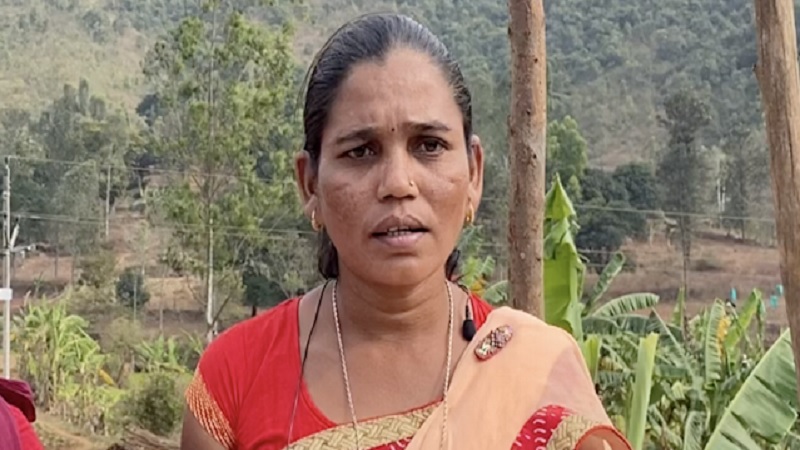
Image Courtesy: theleaflet.in
Mumbai: ten months ago, on March 9, 2021, when dozens of Adivasi women from across different villages had gathered at Sameli village in the conflict-torn Dantewada district to mark International Women’s Day, a large group of paramilitary force personnel – aided by the local district police and District Reserve Guard (DRG) – swept down on the gathering.
The meeting was abruptly dispersed and the heavily armed force whisked away Hidme Markam in an SUV. Markam, a well-known forest rights and prisoners’ rights activist, was branded as a “dreaded Naxalite”. In s widely publicised campaign, the police, claimed that she carried a reward of Rs 1 lakh. She was shown “wanted” in five cases of violent Naxal attacks and nearly two years of imprisonment later, the police have failed to prove the charges. Now, in January 2023, Markam has now been acquitted in four cases and granted bail in one. Her advocate, Xitij Dubey confirmed that a sessions court on January 4 acquitted her in the fourth case. In the fifth case, the lawyer confirmed, that the court had granted her bail a few months ago but Markam had waited to be acquitted in other cases to come out on bail. She was released from Jagdalpur Central prison finally on January 5 at 7 pm.
While four of the cases were handled by the state police, one case was investigated by the National Investigation Agency. Markam faced serious charges under the Indian Penal Code and the draconian Unlawful Activities (Prevention) Act (UAPA), but none could be proved. The courts, one after another, turned down the prosecution’s case. Since the process is the punishment in the mater of these laws, it cost her 22 months of personal liberty.
For over a decade, Hidme Markam has been working in the Bastar region as a forest rights and prisoners’ rights activist. The March 9 event in 2021 – from where she was arrested – was organised in response to the alleged police violence that had led to a death of an 18-year-old woman, Pande Kawasi, in custody. Kawasi’s death was later shown to be a case of suicide.
She has also been at the forefront of protesting against several coercive mining projects. As a crucial part of the Jail Bandi Rihai Manch (Committee for the Release of Arrested Persons), Markam had been documenting information from every village and readying a case for the release of prisoners – several of whom were arrested as part of excesses by the state and central forces in the region.
Markam is an unlettered woman and can only converse in her native Gondi. Her intrepid work, led villagers to impose trust in her: they approached her each time there was an incident of state or Naxal excess in the region.
‘Evidence did not prove any involvement’
The first case that Markam was arrested in related to an armed attack on the police team in 2016. In the second case of 2017, the police claimed that Markam was involved in the killing of a villager, who was first allegedly abducted and then murdered by the Naxals. “The trial, in this case, was already concluded and those arrested had already been acquitted by the sessions court.
Besides the murder case, in which the victim’s family had testified, in other cases, the prosecution only had police witnesses to rely upon. “But these witnesses and the evidence shown in court failed to prove Markam’s involvement in the cases,” her lawyer explained to the media.
Markam, who led an active public life, traveling and participating in public mobilisations, also part of several fact-finding teams. Yet she was shown to be a “wanted accused” in these cases.
The NIA’s case, similar to the local police’s cases, was also in connection with an alleged “terror attack”. This, says her lawyer, was one of the cases that she was acquitted in. Even though the police repeatedly failed to prove the charges, the Dantewada sessions court still denied her bail. Her bail application in the Chhattisgarh high court has also been rejected. Hence her legal team remained focused on the trial.
In the one pending case, Dubey said the court has already examined all witnesses. Only the statement of the accused under section 313 of CrPC is yet to be recorded after which the case is expected to conclude.
Markam, before her arrest, had been working closely with tribal rights activist Soni Sori, who also faced prolonged incarceration in the past.
Markam’s arrest had led to both national and international protests. A group of seven UN experts had written to Prime Minister Narendra Modi seeking her immediate release. The People’s Union for Civil Liberties (PUCL) had petitioned the National Human Rights Commission (NHRC) seeking its urgent intervention in the matter and also led many campaigns both in Chhattisgarh and Delhi.
PUCL’s state president Degree Prasad Chouhan highlighted the reason behind Markam’s incarceration. “The intention is never to prove these cases but to stifle courageous voices like that of Markam. Like Markam, several Adivasi youths have been languishing in jail for speaking up against state atrocity,” he said.
Related:
Chorus grows for Hidme Markam’s release
Arrest security personnel for shooting Adivasi youth: Latehar villagers
Free HRD Hidme Markam from arbitrary UAPA charges: Front Line defenders